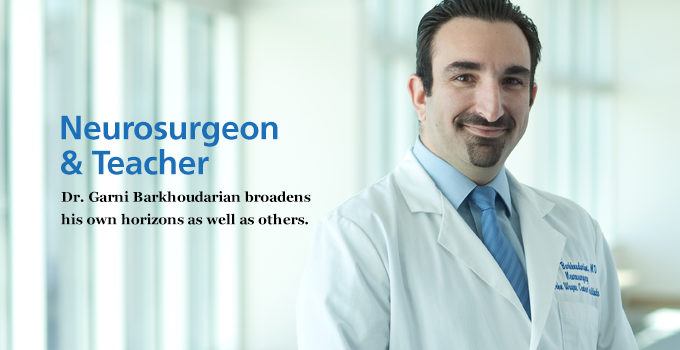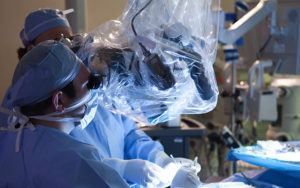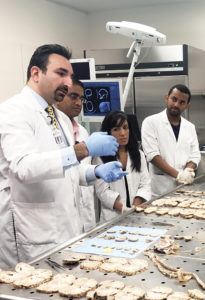

PHYSICIAN SPOTLIGHT: Dr. Garni Barkhoudarian, Neurosurgeon and Teacher
by Zara Jethani
Garni Barkhoudarian, MD, is the Co-Director of the Pacific Pituitary Disorders Center and the Director of the Pacific Adult Hydrocephalus and Facial Pain Centers at Pacific Neuroscience Institute (PNI). As a highly skilled neurosurgeon, Dr. Barkhoudarian uses minimally invasive endoscopic surgery to treat his patients with a focus on improved outcomes and rapid recovery.
From a young age Dr. Barkhoudarian was determined to become a physician. He spent many summers working in the medical field gaining knowledge and experience, and in medical school at the University of Michigan, he made up his mind to become a brain surgeon. ” The first time I saw a living, glistening, pulsating brain, I was hooked,” he says. ” I gravitated to the complex anatomy of the brain, its intricate neural networks conferring consciousness and complex emotions, and vulnerability to external forces. Patients with neurosurgical disorders pose a certain challenge on all levels – from diagnosis to post-operative recovery.”
A family man and father of two boys, Dr. Barkhoudarian is aware of the influence parents have on their children. His own parents, a biologist and an engineer shaped his viewpoint and as a surgeon, there have been defining experiences that have brought a particular perspective to the way he treats his patients.
 “Every surgeon remembers a patient that affects one significantly. Mine was a young father who suffered a cerebral hemorrhage and nearly died from its complications. He spent 3 weeks in the intensive care unit before recovering and returning to his family. This experience instilled in me the resilience of the human brain, powered by a drive and desire to heal. Even in the most dire circumstances, there is possibility to recover and conquer neurological conditions.”
“Every surgeon remembers a patient that affects one significantly. Mine was a young father who suffered a cerebral hemorrhage and nearly died from its complications. He spent 3 weeks in the intensive care unit before recovering and returning to his family. This experience instilled in me the resilience of the human brain, powered by a drive and desire to heal. Even in the most dire circumstances, there is possibility to recover and conquer neurological conditions.”
To address the unique challenges involved in treating patients with brain and pituitary tumors, Dr. Barkhoudarian says, “Patients with both benign and malignant brain tumors can be very challenging to treat. There are numerous non-surgical considerations including endocrine dysfunction and hormone secretion for pituitary tumors and cancer spread / tumor burden for malignant disease. Surgery plays an important role for the treatment of these tumors, but often is combined with adjuvant therapy including stereotactic radiosurgery and targeted chemotherapy. In recent years, a better understanding of the genetics and immune system interaction of cancer has allowed for more targeted, personalized care for these patients.”
Part of what Dr. Barkhoudarian does is teach others about neurosurgery. His experience and expertise as a neurosurgeon translate directly into his involvement in education. Dr. Barkhoudarian helps staff the pituitary clinic at Harbor/UCLA, teaching endocrinology and neurosurgery residents the intricacies of pituitary tumor patient management. On a national level, he is the managing editor of the Self-Assessment in Neurological Surgery (SANS), a committee within the Congress of Neurological Surgeons (CNS) that writes examinations for assessment of residents, fellows and practicing neurosurgeons. Many of these questions are used for the American Board of Neurological Surgery (ABNS) written exam. Additionally, he teaches courses nationally and internationally to help advance minimally invasive and endoscopic surgical techniques.
 In 2012, Dr. Barkhoudarian established the Minimally Invasive and Endoscopic Microdissection Laboratory at the Saint John’s Cancer Institute, part of Providence Saint John’s Heath Center. As director, he trains clinical and international fellows on the nuances of surgical anatomy.
In 2012, Dr. Barkhoudarian established the Minimally Invasive and Endoscopic Microdissection Laboratory at the Saint John’s Cancer Institute, part of Providence Saint John’s Heath Center. As director, he trains clinical and international fellows on the nuances of surgical anatomy.
In addition, the Pacific Brain Tumor Center offers highly competitive clinical and international neurosurgical fellowships that provide surgeons with a multidisciplinary experience in a busy center of excellence. “The brain is a fascinating, delicate and complex organ. The only way that a surgeon can hone their craft is by practicing. At the lab, our fellows can actually see and analyze the structures that they will be concentrating on in the operating room.”
“Teaching is a critical component of academic neurosurgery. Not only does this improve the students’ understanding of the topic, but it forces the teacher to stay ahead of the curve and advance his expertise as well. I find that I learn more when teaching a subject than merely reading an article or listening to a lecture. I hope to instill this passion in our trainees as well.”
 At the microdissection lab, cadaver heads are obtained through medical companies that supply properly processed organs for educational purposes. In addition, routine brain dissections of patients with brain cancer are performed at the Providence Saint Johns Health Center morgue. In that setting, Dr. Barkhoudarian conducts surgical dissections exposing various brain structures through cross-sectional views and correlating with patient pathology.
At the microdissection lab, cadaver heads are obtained through medical companies that supply properly processed organs for educational purposes. In addition, routine brain dissections of patients with brain cancer are performed at the Providence Saint Johns Health Center morgue. In that setting, Dr. Barkhoudarian conducts surgical dissections exposing various brain structures through cross-sectional views and correlating with patient pathology.
This month, the microdissection lab was the venue for the inaugural PNI Clinico-Pathologic Conference, which was open to neuroscience research center neuroscientists, pathologists, international visiting neurosurgeons and neurosurgical fellows.
“This represents the first in a quarterly series of conferences that we hope will deepen our colleagues’ neurosurgical knowledge to complement their own areas of expertise,” says Dr. Barkhoudarian. “As a neurosurgeon, I find education just as valuable when given as when received. I am blessed to have had excellent teachers and mentors who guided my early career. There is a high level of satisfaction as well as the fulfillment of a sense of duty in educating the younger generation of neurosurgeons.”
The Microdissection Laboratory is sponsored by Karl Storz Endoskope North America, Stryker Corporation, Mizuho Medical company Ltd, Surgical West Inc. and Providence Saint John’s Health Center. Generous funding is provided by the Westervelt Family and the Amendjian Family.
About the Author

Zara Jethani
Zara is the marketing director at Pacific Neuroscience Institute. Her background is in molecular genetics research and healthcare marketing. In addition, she is a graphic designer with more than 20 years experience in the healthcare, education and entertainment industries.
Last updated: May 3rd, 2022